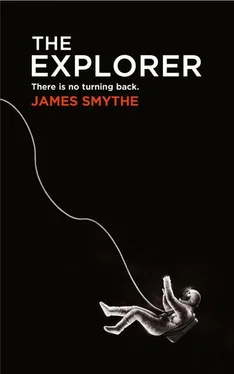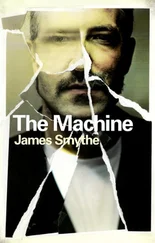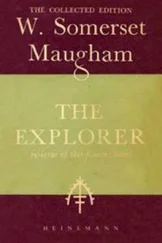‘It brings about a sense of camaraderie,’ they said, ‘to remind you of the comfort and security of being together: not alone, but part of a unit, working together towards a single goal. Subconsciously, it will remind you of eating home-cooked meals with your family.’
‘That’s a great idea,’ I remember Quinn saying, ‘but my mother never cooked shitty meal bars from cellophane packets.’ There are no knives and forks, clearly, just hundreds of sachets of meal bars. They’re all sponsored by fast-food companies, and they taste just like the real burgers and chips and puddings, only in these reformed bars, hard and crispy when they’ve been heated, soft and damp when not. We have exercise machines, all designed to provide physical stress, resistance, and we’re meant to use them for half an hour a day to prevent bone loss. Then there are the beds, designed for comfort and stasis, used every night. They sit at a 45-degree angle, and we sleep with buffers around us to stop us slipping in any direction. There are padded straps to hold us in. We all, at one point or another, floated whilst sleeping. It seemed silly not to. They all have doors. Their glass is frosted, but you can still see the bodies through it. We have everything we could ever need up here, in the front, in what passes as a cockpit, a lounge, a bedroom, a cabin. It’s almost upper-class.
I’ve thought of killing myself, but something stops me. Just think, it says, you’ll go further than anyone else has ever been. You’ll see deeper into space than anybody else has ever seen. You’ll make history.
‘But nobody will ever know,’ I reply, and the something doesn’t say anything back to me, just sits there in the dark. I take my place in the chair at the front of the ship and decide to ride it out.
I take sleeping pills. I don’t know what I’m trying to achieve by this. Sleeping pills are a cry for help, right? I take a handful, because I don’t know how many I’m meant to take. They’re not even kept in the medicine cabinet: we were given our own supply, because we were told we might have trouble with sleeping. I vomit them up into a white paper bag, then dispose of it in the refuse. It makes me feel awful. I don’t know why I did it. I’ve never been that sort of person. I’ve never had that sort of strength.
When things beep on technology you don’t know how to operate it’s the worst thing in the world. There’s a flat panel covered in switches, next to the big Go/Pause button, and there’s a screen covered in jargon that means nothing. It’s fine knowing about the placements of stars: why they build this thing for only engineers to understand I cannot fathom. I understand the fuel readings, and I understand the energy cell readings – we are running at 42% fuel, 93% piezoelectricefficiency, six hours of reserve energy in the cells – and I understand how to tell that Life Support is working. On the screen, a tiny number flashes: 250480. I don’t recognize it, or know what it means. It’s in a small box, the kind that pops up when the computer crashes or when you open a program or when you’ve got a meeting scheduled. It starts to beep as well, and there’s a tiny red light, the size of a pinhead, that starts flashing, a solitary LED that I wouldn’t even notice if I wasn’t floating directly over it. There’s a Help system on the computer so I boot another screen and type it in, to search through the thousands of documents about how this shuttle works, but nothing comes up. 250480. Nothing at all. It doesn’t seem to reference anything; it doesn’t seem to have any meaning.
‘I have to ignore it,’ I say to myself.
Something that might be of interest: we could have travelled faster than we have been. The engines that we’re fitted with are two-year-old tech, and the advancements that have been made since then are incredible. We could have been doing this almost three times as fast, but the rate of fuel consumption meant that we would have been lucky to reach the Moon. Signals through space, though, they’re different; they’re waves. They travel faster than we can, because they don’t weigh anything. We give them a distance and a direction and fire them off, and Bang! We hope that they hit their targets. We haven’t had a long-distance message since we left our orbit – or, technically, the magnetosphere, so the scientists told me. Maybe this is what happens when a message arrives. Maybe there’s some sort of subspace signal, and this is the information. 250480. This is their way of telling me I’m going to be getting home.
The light stops shining just as I am getting excited, and the beeping stops a second, maybe two, after it. The 250480 is still there on the screen after the prompt, but it rapidly gets shunted down the list as the fuel readings – 41% fuel, 93% energy, six hours’ life support – tick by and replace it.
Outside, the sky is beautiful. We – that is, those of us in space, travelling here where nobody has been before – we don’t think of it in terms of sky, or even as space. We think in terms of an actual space, of blackness, of The Dark, that which we don’t understand. We over-word it, write about it in terms that we think people will find attractive, beautiful, moving, meaningful. We mystify it: It’s what we don’t know, something else entirely, something abnormal and terrifying and still and completely other-worldly, in the most literal sense of the phrase. Here, where you’re close enough to touch it, it is just space; there’s nothing to touch even if you want to. And there’s no definition of a horizon, no way to tell where we actually are, not really. We can say, ‘Well, we’ve travelled this far’ – I can say, ‘Well, I’ve travelled this far, I know how much fuel the ship has used, there’s no resistance, the readings must be right’ – but the relationship I have to what’s out here is nothing. It’s a number. This deep into space, there’s nothing. It’s dark, like oil or tar. I can’t see stars. If this wasn’t already fucked up enough, I’d worry there was something wrong. As it is, I revel in the nothing. I drink it in.
The ship has this thing that we call the Bubble, built into the ceiling of the main room, a raised dome of impenetrable plastic where we can get a 360-degree view of everything around us – and when they were all still alive I could see it, and they told me what it was we were seeing, what was Earth, when the light was right. From that distance it looked white, almost. Shiny, like a tiny coin.
When we first woke up it was all I wanted to stare at, even when we were dealing with Arlen’s body. Using the telescope computers’ highest zoom. We left in August, and the clouds were thin. Those first couple of days I would just catch myself watching Earth behind us, marvelling when the planet was half in darkness, a nearly perfect line jutting across the land, scraping along as the planet turned, a duvet being slowly pulled back, waking people as it went. At any given moment you could see how much of any country was still asleep, their cities lit up like embers, and how much was awake, lights off, going about their business. Through the digital telescopes we could see ships in the sea, the path they were cutting, tiny dots with white trails like slugs. We could see planes hitting the atmosphere, commercial flights. We could see the shape of cities, and make faces out of them; we could see faces in the clouds, only from the other side of them.
Being in space gives you a sense of philosophy, a sense of something other than yourself. You look out at the sky – because we’re used to that thing above us being sky – but when you’re part of it, what is it then? It’s nothing, or it’s everything. It’s just where you are. Here, in the middle of space, or at the end, or the start, I have no idea – here is just where I currently am.
Читать дальше
Конец ознакомительного отрывка
Купить книгу












